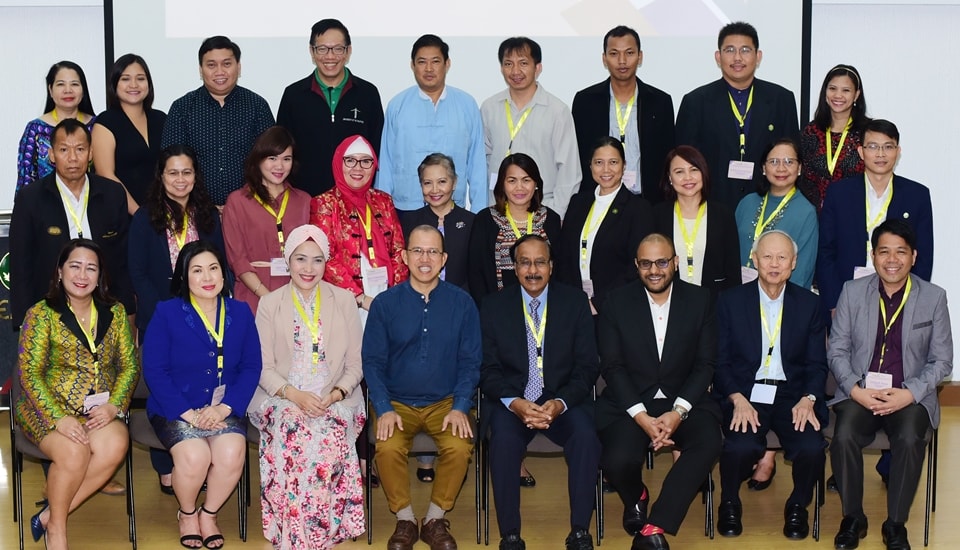 Participants and resource persons of the leadership program with Dr. Glenn B. Gregorio, SEARCA Director (1st row, 4th from left) and Mr. Joselito G. Florendo, Deputy Director for Administration (3rd row, 4th from left).
Participants and resource persons of the leadership program with Dr. Glenn B. Gregorio, SEARCA Director (1st row, 4th from left) and Mr. Joselito G. Florendo, Deputy Director for Administration (3rd row, 4th from left).
LOS BAÑOS, Laguna – With volcanic plumes looming in the sky and volcanic ash in the air, leaders from higher education institutions (HEI) in Southeast Asia braved the impending eruption of Taal volcano to collectively seek solutions to contemporary challenges faced by HEI through the Leadership Development Program for HEIs in Southeast Asia. The leaders included presidents, vice presidents, deans and assistant deans, registrars, and department heads from colleges and universities in Brunei Darussalam, Cambodia, Lao PDR, Myanmar, Philippines, and Vietnam.
Co-organized by the Southeast Asian Regional Center for Graduate Study and Research in Agriculture (SEARCA) and the Singapore based The HEAD Foundation (THF), the program was designed as a capacity building workshop for administrators, middle and senior managers, and academic leaders of HEIs in Southeast Asia. It is being held this 13-17 January 2020 at SEARCA.
"It is not the strongest who would prevail, it is those who will adapt to change."
In his welcome remarks during the opening program, SEARCA Director Dr. Glenn B. Gregorio stressed that this quote is true not just in biology but also for institutions. Dr. Gregorio said that everyone needs to change or we naturally become extinct. HEIs, however, must not only follow the trend but be one step ahead. Among the changes that HEIs in the region need to adapt to stem from initiatives of the Association of Southeast Asian Nations (ASEAN), including the ASEAN Economic Community (AEC) agenda and ASEAN International Mobility for Students (AIMS) initiative.
The program, therefore, aims to provide a platform for higher education leadership in the context of local and regional contemporary challenges. Through exercises involving environmental scans, design thinking, and strategic management, the participants were able to identify and prioritize cross-cutting issues that need to be addressed in light of the rapidly changing needs of industry and the workplace.
 Participants were introduced to contemporary tools, like this Lego Serious Play kit used in design thinking for managing change and conflict in higher education institutes.
Participants were introduced to contemporary tools, like this Lego Serious Play kit used in design thinking for managing change and conflict in higher education institutes.
In the program overview, Course Program Director Dr. Natarajan Varaprasad discussed that these contemporary issues include having a relevant curriculum, addressing disruptive technologies, internationalization, adaptive learning and re-learning, and limited resources. He said that HEIs today must address these issues while working in a volatile, uncertain, complex, and ambiguous environment. Dr. Varaprasad is one of the resource persons and is managing partner and principal consultant of the Singapore Education Consulting Group LLP.
The course is composed of nine modules that help participants analyze and develop strategies to address the said issues: (1) Challenges, Issues and Opportunities: Analysis of External Factors and Positioning of HEIs; (2) High-performance Leadership: Values and Ethics; (3) Strategic Management; (4) Design Thinking; (5) Faculty and Staff Development in HEI; (6) Disruptive Technologies in Teaching and Learning; (7) Quality Assurance in Teaching and Learning; (8) ASEAN Mutual Recognition Framework Arrangements; and (9) Transitioning from Management to Leadership.
Aside from Dr. Varaprasad, other resource persons include Dr. Paul P. S. Teng, SEARCA Senior Fellow and Managing Director and Dean of the National Institute of Education, Nanyang Technological University; Dr. Fay Lea Patria M. Lauraya, President of the University of Nueva Caceres in the Philippines; Dr. Rebekah Wei Ying Lim, Director of the Teaching and Learning Centre of the Singapore University of Social Sciences (SUSS); Dr. Calvin M. L. Chan, Director of the Office of Graduate Studies of SUSS; Dr. Felix Tan, Senior Lecturer at the University of New South Wales Business School in Australia; and Dr. Supachai Yavaprabhas, Professor of Political Science at Chulalongkorn University in Thailand.
At the end of the program, participants are expected to prepare a strategic agenda for submission to their own HEI management, which will include action points embodying their take-home lessons on education and managerial leadership. These re-entry action plans should address the priority needs of their institutions for levelling-up in step with AEC 2025.
This is the second batch of participants for this course, with the first one also held at SEARCA on 21-25 January 2019. A third offering is in the works by SEARCA and THF for 2021.